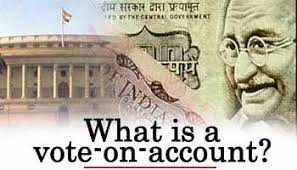A Vote on Account is a temporary provision made by the government of a country to obtain the approval of the Parliament or the legislature for withdrawing money from the Consolidated Fund of the country to meet its expenses until the full budget is passed. It is a unique process that is followed in many countries, including India. This article will explain its purpose, and how it works in India.

Table of Contents
What is a Vote on Account?
It is a financial instrument that is used by the government to obtain funds for the government’s expenditures in the short term. It is a mechanism used to obtain approval from the Parliament or the legislature for drawing funds from the Consolidated Fund of India, which is the government’s account. It is presented to the Parliament or the legislature before the budget is passed. The Vote on Account is a temporary provision that allows the government to continue its expenditures until the full budget is passed.
Purpose of a Vote on Account
The main purpose is to ensure that the government has the funds necessary to continue its operations until the full budget is passed. In India, the budget is presented on February 1st every year, and the financial year starts on April 1st. The Vote on Account is presented to the Parliament or the legislature before February 1st to ensure that the government has enough funds to operate until the budget is passed.
How does it work?
It is presented to the Parliament or the legislature before the budget is passed. This is a statement of the government’s estimated receipts and expenditure for a short period, usually for two months. The Parliament or the legislature debates and approves it, which allows the government to withdraw funds from the Consolidated Fund of India. The government can withdraw funds from the Consolidated Fund of India only after the it is approved by the Parliament or the legislature.
It is usually presented in the form of a bill known as the Vote on Account Bill. It is introduced in the Lok Sabha, the lower house of the Parliament. The Bill is debated and approved by the Lok Sabha, and then it is sent to the Rajya Sabha, the upper house of the Parliament. The Rajya Sabha can either approve the Bill or suggest amendments to it. If the Rajya Sabha suggests any amendments, the Bill goes back to the Lok Sabha for approval. Once the Bill is approved by both houses of the Parliament, it becomes law, and the government can withdraw funds from the Consolidated Fund of India.
Benefits of a Vote on Account
It has several benefits. First, it ensures that the government has the funds necessary to continue its operations until the full budget is passed. This is particularly important in a developing country like India, where the government provides essential services such as health care, education, and infrastructure. Second, the Vote on Account is a way for the Parliament or the legislature to exercise its oversight over the government’s spending. By debating and approving the Vote on Account, the Parliament or the legislature can ensure that the government’s expenditures are in line with the country’s needs and priorities. Finally, the Vote on Account provides a degree of stability and predictability to the financial markets. The financial markets can be volatile, and a Vote on Account ensures that the government has the funds necessary to continue its operations, which provides stability and predictability to the financial markets.
Conclusion
A Vote on Account is a temporary provision made by the government of a country to obtain approval from the Parliament or the legislature for withdrawing funds from the Consolidated Fund of the country to meet its expenses until the full budget is passed. The Vote on Account is an essential financial instrument that ensures that the government has the continue the necessary funds to operate until the full budget is passed.
Important Links